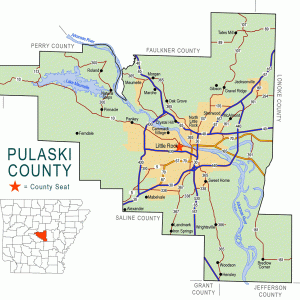calsfoundation@cals.org
Douglasville (Pulaski County)
The unincorporated community of Douglasville existed in an area that later became part of southwest-central Little Rock (Pulaski County). Present-day Colonel Glenn Avenue (previously Asher Avenue) runs through the area, which is today referred to as the Westwood or Western Hills neighborhood. The community remained relatively small and rural prior to being overtaken by the growing city of Little Rock in the middle of the twentieth century.
James DeBaun and Darwin Lindsley filed patents on parcels of land that would later become Douglasville on July 28, 1838. The land was located between Rock Creek and Brodie Creek. In the 1840 federal census, DeBaun was listed as having thirteen free white residents on his property, as well as thirteen enslaved people, though these individuals may not have lived in the area later known as Douglasville, as that was not his only land holding. On June 16, 1847, DeBaun and his son James DeBaun Jr. were shot at Pine Bluff (Jefferson County) by unknown persons, and the elder DeBaun died instantly. His son lived on, not dying until 1867, and the Weekly Arkansas Gazette remembered his father as “a most estimable gentleman who was for many years a leading merchant and valued citizen of Little Rock.”
Like DeBaun, Darwin Lindsley was also a local businessman who bought several tracts of land in the area, including the property that would later develop into Douglasville, but he apparently ran into some financial trouble. Most notably, in 1842, he was sued by William E. Woodruff over a debt of $375, with interest.
The origins of the name Douglasville are never specified in any reports, although numerous people with the last name of Douglas lived in the area at various times. The area remained fairly rural through the nineteenth century and early twentieth century, home to several farms, including dairy farms and pig farms. In the early twentieth century, children attended the Zion Hill School District No. 1. A. B. Gerlach, who had previously served on the school board in Argenta—present-day North Little Rock (Pulaski County)—took the position as principal of the Zion Hill school in September 1917. The community had a Masonic hall, too, but it never had its own post office, although the Asher Post Office was later established, when the area was incorporated into Little Rock, where Douglasville was located.
Douglasville attracted only occasional attention in local newspapers. For example, an August 17, 1917, article in the Arkansas Democrat, “Red Cross to Aid Sanitary Work,” reported that Dr. C. C. Pierce, “senior surgeon of the United States Public Health Service,” had, as part of rural service work funded by the American Red Cross, “visited Douglasville, on the Nineteenth street pike, Thursday, and vaccinated 69 persons against typhoid.” An Epworth League, being an association of Methodist young adults, was established on March 10, 1918. In the early 1920s, Douglasville was home to Morgan’s Place, a restaurant serving food to those driving down the Hot Springs Highway (now Highway 5).
During Prohibition, on June 6, 1919, the Arkansas Gazette published an article titled, “Property Values around This Grove Should Rise,” which reported, “One of the largest whiskey hauls ever made in Arkansas was perpetrated yesterday afternoon, when 1,000 pints of whiskey were found in three pits in a 20-acre pine thicket on the hog farm of C. W. Porter, negro, seven miles out on the Nineteenth street pike, near Douglasville.” A few years later, the January 1, 1922, the killing of John Kelly by John Bailey (both of them African American) also attracted attention. As the Arkansas Democrat reported, Bailey had won $30 from Kelly by gambling, taking Kelly’s revolver as security. Kelly tried to take the revolver by force, and Bailey shot him with his own gun.
The Douglasville Methodist Episcopal Church, South, congregation was founded in 1915 and erected a church in 1928 on what later became Colonel Glenn Avenue. The Douglasville congregation relocated just south of this site in 1935 and later took the name Western Hills United Methodist Church after the road on which it was located, though the original stone church building still stands on Colonel Glenn in the twenty-first century. The Jewish community founded the Westridge Country Club in 1948 on land adjacent to the Methodist church. Western Hills Elementary School opened in 1966 just south of the church and country club; the country club folded the following year due to financial difficulties. The Methodist church acquired the former country club building. In the twenty-first century, attendance at Western Hills United Methodist Church declined, and the congregation put the two buildings and land up for sale in 2025.
For additional information:
“Around the City.” Arkansas Democrat, March 11, 1918, p. 15.
Boyd, Gregory A. Family Maps of Pulaski County, Arkansas. Norman, OK: Arphax Publishing Co., 2005.
“Negro Slayer Is Bound Over.” Arkansas Democrat, February 7, 1922, p. 3.
“Property Values around This Grove Should Rise.” Arkansas Gazette, June 6, 1919, p. 1.
“Red Cross to Aid Sanitary Work.” Arkansas Democrat, August 17, 1917, p. 9.
Staff of the CALS Encyclopedia of Arkansas







Comments
No comments on this entry yet.